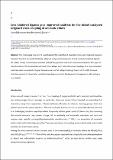Less hindered ligands give improved catalysts for the nickel catalysed Grignard cross-coupling of aromatic ethers
Abstract
The challenging reaction of unactivated ortho-substituted aromatic ethers with Grignard reagents has been found to be most effectively catalysed using nickel complexes of less sterically hindered ligands. Air stable, cheap, commercially available [NiCl2(PnBu3)2] stands out as an improved catalyst for this type of transformation. The improved results with this catalyst even extend to some couplings of a more activated substrate when examined at higher temperatures and at catalyst loadings down to 0.1 mol%. Unusual induction periods in these latter reactions have been related to the by-product magnesium salts acting as co-catalysts.
Citation
Harkness , G J & Clarke , M L 2018 , ' Less hindered ligands give improved catalysts for the nickel catalysed Grignard cross-coupling of aromatic ethers ' , Catalysis Science & Technology , vol. 8 , no. 1 , pp. 328-334 . https://doi.org/10.1039/C7CY01205E
Publication
Catalysis Science & Technology
Status
Peer reviewed
ISSN
2044-4753Type
Journal article
Description
The authors thanks the EPSRC for funding in the initial stages of this work from EP/J018139/1 and from the DTG.Collections
Items in the St Andrews Research Repository are protected by copyright, with all rights reserved, unless otherwise indicated.

